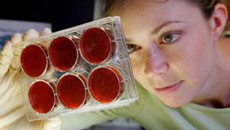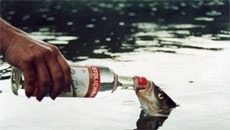On this World Hepatitis Day, there's good news for patients, particularly from India, for those suffering from hepatitis C.
Two new pill-only antiviral drug regimens could provide shorter, more effective treatment options with fewer side effects for the majority of patients infected with hepatitis C, even those most difficult to treat, according to the results of two new studies.
Both studies focused on hepatitis C genotype 1, one of the most difficult to treat.
On Monday, there were reports that the Indian government was importing Rs.1 crore ($166,000) worth one of the drugs - sofosbuvir. Each pill costs $1,000 or $84,000 for a 12-week course.
Around 150 million people worldwide have chronic hepatitis C virus (HCV) infection, a condition that is a major cause of liver cirrhosis and liver cancer.
Until recently, the standard of care for chronic HCV genotype 1 involved a combination of three drugs; ribavirin (RBV), pegylated interferon (PEG) and a protease inhibitor, which together inhibit viral replication and enhance the body's immune response to eradicate the virus.
These drugs can place a substantial burden on the patient, with complicated injection and pill regimens, which can involve up to 18 tablets a day and last for up to a year, and can also cause severe side effects including anaemia and depression.
Direct-acting antiviral agents (DAAs) provide new opportunities for treatment whilst reducing the need for interferon and ribavirin and their potential side effects, one of these two studies showed.
Researchers assigned 645 patients with HCV genotype 1b from 18 countries to receive a 6-month course of treatment with a pair of oral DAAs asunaprevir and daclatasvir.
With this regimen, 90 percent of previously untreated patients and 82 percent who were intolerant of, or who had been treated unsuccessfully using standard regimens, were cured.
"This new all-oral interferon and ribavirin-free combination could provide a more effective, safer, shorter, and simpler treatment option for those traditionally hard-to-cure patients with cirrhosis or those who have failed to respond to existing therapies," said professor Michael Manns from Hannover Medical School in Germany.
In a separate study, a team of researchers led by professor Eric Lawitz from University of Texas Health Science Center in San Antonio, assigned 167 individuals with HCV genotype 1a and 1b to receive a 12-week or 24-week course of once-daily sofosbuvir plus simeprevir with or without ribavirin.
After just 12 weeks of treatment without ribavirin, 93 percent of participants (including those with cirrhosis and previous non-responders to interferon-based treatment) were cured - with no detectable virus in their blood three months after treatment had stopped.
Both the studies appeared in the journal The Lancet.





